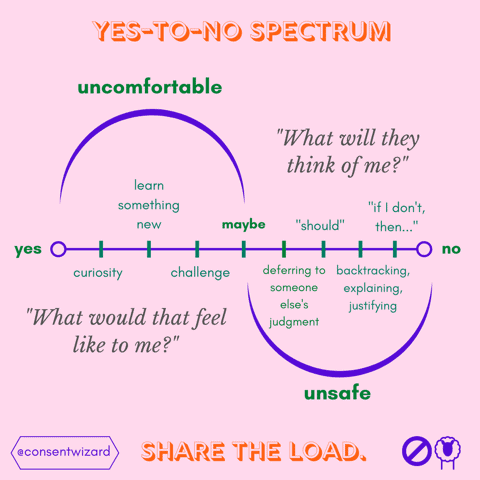Dr. Betty Martin, the mind behind the Wheel of Consent, talks about the difference between wanting and being willing to do something. Wanting to do something means it’s your own desire; being willing to do something means it’s someone else’s desire. I’m likely less visibly enthusiastic when I’m willing, but that does not mean it’s not consensual. We can think of this very simply in a non-sexual context. I never want to take out my trash, but taking out the trash is not a nonconsensual act. In a sexual context, my partner might want me to pee on them. I’m not all school-spirit about it, but I’m fully willing and fully consenting.
For some, a partner’s willingness isn’t enough. They want their partner to have the same desires or it’s no fun for them. It’s important to remember that when someone is willing, often the reason why that’s not enough for their partner is because they, the partner, may have trouble receiving. The blockage is sometimes that they don’t feel they deserve the gift. We can’t push people to want what we want; we can, however, work on our ability to receive.
Sometimes people pay for enthusiasm. In a sex work context, a sex worker may not want—in the sense that it’s their own desire—to do everything (or anything, for that matter) that their client wants, but for a price they can be fully willing and consenting to engage in whatever act they agree to. The enthusiasm might be part of the pleasure for the client and so the sex worker might be able to perform that for their client, again for the right price.
For survivors of sexual assault, requiring enthusiasm is an enormous hurtle. Those of us trying to get back into our bodies after an assault can be nervous, shy, and have complicated, conflicting feelings about sex. We might want to want to have sex. We might need to go slowly, cautiously, and build trust. This doesn’t look like a “yes puh-lease!!” to anyone on the outside looking in. Saying enthusiasm is a requirement would make a lot of sex for survivors utterly impossible.
Survivors or not, some people need a warm-up. This can be negotiated consensually. Perhaps your libido needs some gentle ear nibbling or a back rub before it wakes up. This might not look enthusiastic in the traditional sense, but to say this kind of touch and the sex that happens after are not consensual would be an attack on someone’s agency and autonomy.
And what about trying new things? I still get nervous when I try something new in bed, and sometimes even when I’m doing something I’ve done a million times but with a new person. Requiring enthusiasm gets in the way of my curiosity and exploration when I might feel hesitant but still want to tiptoe into a new experience with care and caution.
In my work in TV and film, the nudity or simulated sex that actors are engaging in is their job. As an intimacy coordinator, I would be immediately concerned and would need to speak to a producer if an actor informed me that they were stoked about making out with their coworker. I have a hard time believing that anyone would be jumping for joy about getting naked on set. This is their work, and they don’t have to be enthusiastic in order to be fully within the bounds of consent.
Often what looks like enthusiasm is actually a people-pleasing reflex. The high pitched, instant, “Sure!” we sometimes give in response to a request seems enthusiastic, but this reaction usually means that someone isn’t really taking the time to check in with themselves before responding. I see this on set with actors quite a bit. This knee-jerk enthusiasm is part of the culture actors are indoctrinated into, where they are told they are the vessel for the director’s vision and the writer’s story and they should be game and willing to help achieve that vision regardless of their comfort. They’re told this by the media (when was the last time you saw Fame?), by their agents and managers, by casting directors, and acting teachers. It’s an old-school, vestigial hierarchy, but denying that it’s real because we don’t like it doesn’t actually interrupt it. No matter how much a director might hope and want actors to be able to tell them when they’re uncomfortable, the power dynamic exists. And unfortunately, we are not entitled to know when we’ve made someone uncomfortable. They are not obligated to tell us.
Praise the Pause
I used to teach that what constituted enthusiastic consent was actually a thoughtful pause before answering. Even though that can feel like a ‘no’ to the person making the request or offer – and, if you’re me, send you into a bit of a regret spiral, saying in my head, “Oh shit, I shouldn’t have asked. Never mind!!” – I’m working towards being grateful for that pause because it means someone is properly checking in with themselves. I try to sit in that pause with them and feel respect for it, instead of letting it mean something about me. Now, with more awareness of the barriers that required enthusiasm puts on us, I no longer teach it when I go over FRIES. Instead, I’ve been offering two other words, created in the intimacy coordination community, that begin with E: engaged or embodied.
Engaged and embodied consent requires us to be present. They show that we are not actively dissociated in a trauma response. We are not under the influence of drugs or alcohol. We are able to take sufficient time to think about our choice, meaning we are not rushed. We are granted the space for careful consideration. Urgency, after all, is a coercion tactic.
Living In The Grey
Consent is often taught in binary terms. We have ‘yes’ and ‘no’ and there’s nothing in between. But that doesn’t account for our complex, self-aware brains that hold past, present, and future, societal prescriptions of our behaviour, other’s needs, our needs, our traumas, our shame, judgment, stigma, and fears all at the same time. Sex is complicated!
I developed a yes-to-no spectrum to help tackle these internal conflicts when we’re not sure whether we want to do something or not.

On the ‘yes’ side, we have things like curiosity, learning something new (or learning something new about yourself), and a challenge or risk. Typically when we’re on that side, the physical feelings might be butterflies, nerves, vibrate-y feelings. Usually we’re thinking very self-reflective thoughts like, “What would that feel like to me?” and “How would I feel if I skip it or lose this opportunity?” These thoughts are very internally oriented.
On the ‘no’ side we have things like deferring to someone else’s judgment, “should” -ing ourselves, backtracking, justifying, or explaining a ‘no,’ and “if I do/don’t…then…” statements which amount to coercion whether they’re coming from someone else or ourselves. The bodily feelings on this side often get described as sinking, shrinking, pressure, or tension. The thoughts we have on this side are concerned with how we’re being perceived by others. “What will they think of me?” “They won’t like me anymore.” “I could be seen as difficult.” These thoughts are very externally oriented and often based on assumptions or projections.
The pressures of being “cool”
When I was sexually assaulted at 19, my PTSD manifested in a feigned enthusiasm. I wanted to want to have sex, I wanted to be a ‘cool girl,’ and I wanted to seem up for anything. I railed against stereotypes of ‘frigid women’ and being uptight or prudish, concepts I felt particularly vulnerable to given my childhood as a ballerina and classical piano student. I cultivated a desire for sex that was more about other people than it was about me. I was so convincing, I even successfully tricked myself.
Now, I take my time. I make sure I’m listening to my body. And, lo and behold, my body deeply, deeply knows when it feels safe and when it doesn’t. What I now perceive as a ‘yes’ is a warm, glowing, gravitational pull in my body towards another person. It doesn’t look like a cheerleader. It doesn’t feel like a “fuck yeah!” It feels like an ancient wisdom deep in my core telling me that what I’m doing is safe.

Mia Schachter (they/them) is a Consent Educator, Intimacy Coordinator for TV, Film, and Theater, a podcaster, musician, and writer living in their hometown of Los Angeles. They teach classes to individuals, couples, and groups online. You can follow their work on Instagram @consentwizard.

